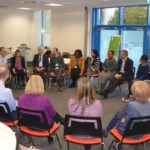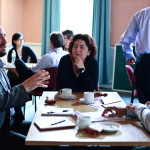The items listed on this page are the core articles of this blook on Conversational Leadership. In addition to the home page, they serve as entry points to the site.
There are several ways in which you may start to read this blook.
- You may start on the home page.
- You may start reading from the first chapter‘s first post and continue sequentially, or start by browsing the Table of Contents.
- You will more likely enter this blook at a random post, having googled a particular phrase. For example, if you google the phrase knowledge is not power, you will likely land on the post of the same name.
- Another way is to start at my frequently asked questions page.
- You may also enter the blook through one of my gateways listed below. Gateway content is the core of this website. It generally consists of the most important, comprehensive articles on the site that best represents Conversational Leadership.
Whatever way you enter the blook, the articles are designed to be primarily standalone and highly hyper-connected. There are several ways of navigating the content, so it is unlikely that you will read sequentially for long.
The gateway posts and pages are listed in alphabetical order below.
 A Brief History of Knowledge 200,000 years of human history - Human knowledge has evolved over millennia, shaping our societies and cultures. However, we often overlook the broad historical context of how knowledge developed. Understanding the… …
A Brief History of Knowledge 200,000 years of human history - Human knowledge has evolved over millennia, shaping our societies and cultures. However, we often overlook the broad historical context of how knowledge developed. Understanding the… … Converse in Good Faith Be sincere, fair, open, and honest, regardless of the outcome - Converse in good faith: Converse with the intent to be sincere, fair, open, and honest, regardless of the outcome of the interaction. …
Converse in Good Faith Be sincere, fair, open, and honest, regardless of the outcome - Converse in good faith: Converse with the intent to be sincere, fair, open, and honest, regardless of the outcome of the interaction. … Disagree Constructively How to disagree well - Disagree constructively: Disagreement is an inevitable part of life. Most of the time, we do it poorly. We need to learn to disagree constructively. How… …
Disagree Constructively How to disagree well - Disagree constructively: Disagreement is an inevitable part of life. Most of the time, we do it poorly. We need to learn to disagree constructively. How… … Freedom of Speech Freedom of speech is not just another value - Freedom of speech is a principle that supports the freedom of an individual or a community to articulate their opinions and ideas without fear of… …
Freedom of Speech Freedom of speech is not just another value - Freedom of speech is a principle that supports the freedom of an individual or a community to articulate their opinions and ideas without fear of… … How Beliefs Shape Reasoning How political views influence the way we interpret data - Political beliefs shape more than opinions—they can distort how we interpret facts. Research shows that even those skilled in numerical reasoning are not immune to… …
How Beliefs Shape Reasoning How political views influence the way we interpret data - Political beliefs shape more than opinions—they can distort how we interpret facts. Research shows that even those skilled in numerical reasoning are not immune to… … Introduction: Conversational Leadership Conversational Leadership - We live in a world shaped by rapid change and growing complexity. Traditional leadership models often fall short in helping us respond wisely and collectively.… …
Introduction: Conversational Leadership Conversational Leadership - We live in a world shaped by rapid change and growing complexity. Traditional leadership models often fall short in helping us respond wisely and collectively.… … Introduction: Knowledge Café Improving decision-making, innovation, and collaboration - The Knowledge Café is a conversational method that gathers a group of people to share knowledge and experiences, learn from one another, build relationships, and… …
Introduction: Knowledge Café Improving decision-making, innovation, and collaboration - The Knowledge Café is a conversational method that gathers a group of people to share knowledge and experiences, learn from one another, build relationships, and… … Introduction: Knowledge Delusion We delude ourselves about what we know and how we make decisions - If we are to create a better world, we need to make better sense of things and improve the decisions we make, especially when it… …
Introduction: Knowledge Delusion We delude ourselves about what we know and how we make decisions - If we are to create a better world, we need to make better sense of things and improve the decisions we make, especially when it… … Introduction: Principles of Conversational Leadership The Principles of Conversational Leadership - The problem - our world is a mess. The context - our world is complex. The outcome - our old ways of working are failing—the… …
Introduction: Principles of Conversational Leadership The Principles of Conversational Leadership - The problem - our world is a mess. The context - our world is complex. The outcome - our old ways of working are failing—the… … Knowledge Is Not Power Our ability to influence people is power - Is knowledge power, or is it potential power? And if knowledge is not power, what is power? …
Knowledge Is Not Power Our ability to influence people is power - Is knowledge power, or is it potential power? And if knowledge is not power, what is power? … Leadership Is a Practice Not a Position of Authority Anyone can practice leadership - Effective leadership is vital for driving positive change in a complex world. However, many view leadership as a position of authority rather than a practice… …
Leadership Is a Practice Not a Position of Authority Anyone can practice leadership - Effective leadership is vital for driving positive change in a complex world. However, many view leadership as a position of authority rather than a practice… … Listen with the Intent to Understand Don't listen with the intent to reply - Listen with the intent to understand: Don't listen with the intent to judge or reply. We all appreciate the benefits of listening, such as listening… …
Listen with the Intent to Understand Don't listen with the intent to reply - Listen with the intent to understand: Don't listen with the intent to judge or reply. We all appreciate the benefits of listening, such as listening… … Make Big Talk Make big talk not small talk - Make Big talk: We are all familiar with small talk. But what's big talk? No, not boasting, bragging, or talking big, but big talk —… …
Make Big Talk Make big talk not small talk - Make Big talk: We are all familiar with small talk. But what's big talk? No, not boasting, bragging, or talking big, but big talk —… … Open, Adaptive Strategy Make employees partners in the strategy process - Strategic planning is evolving, with new approaches that are more inclusive and adaptable. Traditional, closed strategies limit employee involvement, leading to blind spots and disengagement.… …
Open, Adaptive Strategy Make employees partners in the strategy process - Strategic planning is evolving, with new approaches that are more inclusive and adaptable. Traditional, closed strategies limit employee involvement, leading to blind spots and disengagement.… … Our Tribal Nature The human brain is hardwired to be tribal - Humans are innately tribal. We need to belong to groups (tribes) and maintain fulfilling relationships with others. This need significantly impacts how we interact with… …
Our Tribal Nature The human brain is hardwired to be tribal - Humans are innately tribal. We need to belong to groups (tribes) and maintain fulfilling relationships with others. This need significantly impacts how we interact with… … Science Curiosity A desire to seek out and consume scientific information for pleasure - Motivated reasoning is where we look for arguments in favor of conclusions we want to believe, regardless of the evidence. This is a primary stumbling… …
Science Curiosity A desire to seek out and consume scientific information for pleasure - Motivated reasoning is where we look for arguments in favor of conclusions we want to believe, regardless of the evidence. This is a primary stumbling… … Shared Meaning To understand each other's perspectives well enough to accept them - What is shared meaning? The phrase is bandied about a lot but little understood and rarely defined. Let's take a look at it. What is… …
Shared Meaning To understand each other's perspectives well enough to accept them - What is shared meaning? The phrase is bandied about a lot but little understood and rarely defined. Let's take a look at it. What is… … The Difference Between Responsibility and Accountability We take responsibility but are held accountable - We use the words responsibility and accountability loosely in everyday language, but what's the difference? We take responsibility but are held accountable. We can not make someone… …
The Difference Between Responsibility and Accountability We take responsibility but are held accountable - We use the words responsibility and accountability loosely in everyday language, but what's the difference? We take responsibility but are held accountable. We can not make someone… … The Four Levels of Knowledge Management The relation between Conversational Leadership and Knowledge Management - Knowledge Management has evolved since the mid-90s, shifting from managing information to building collective knowledge. The challenge lies in adapting KM practices to meet today's… …
The Four Levels of Knowledge Management The relation between Conversational Leadership and Knowledge Management - Knowledge Management has evolved since the mid-90s, shifting from managing information to building collective knowledge. The challenge lies in adapting KM practices to meet today's… … The Global Information Ecosystem We live in a vast sea of information - The Global Information Ecosystem is a metaphor for the vast sea of interrelated, mainly digital information, in which we live. As we move deeper into… …
The Global Information Ecosystem We live in a vast sea of information - The Global Information Ecosystem is a metaphor for the vast sea of interrelated, mainly digital information, in which we live. As we move deeper into… … The London Coffeehouses of the Enlightenment Centers of Enlightenment thinking - The London coffeehouses of the 17th and 18th centuries were the engines of creation that helped drive the Enlightenment, the European intellectual movement that emphasized… …
The London Coffeehouses of the Enlightenment Centers of Enlightenment thinking - The London coffeehouses of the 17th and 18th centuries were the engines of creation that helped drive the Enlightenment, the European intellectual movement that emphasized… … We All Have the Freedom to Choose If We Choose To The last of human freedoms - People often say, “I have no choice,” but that’s rarely true. Even in the most challenging situations, we can choose our attitude, response, and actions.… …
We All Have the Freedom to Choose If We Choose To The last of human freedoms - People often say, “I have no choice,” but that’s rarely true. Even in the most challenging situations, we can choose our attitude, response, and actions.… … What Is a Real Conversation? There is more to conversation than just talking or exchanging messages - What is a conversation? Is an argument or a debate a conversation? Is an exchange of SMS messages a conversation? You might argue they are.… …
What Is a Real Conversation? There is more to conversation than just talking or exchanging messages - What is a conversation? Is an argument or a debate a conversation? Is an exchange of SMS messages a conversation? You might argue they are.… … What Is Communityship? Where everyone in a community practices leadership - In an article in the Harvard Business Review, Rebuilding Companies as Communities, Henry Mintzberg talks about a concept called communityship. So what is communityship? …
What Is Communityship? Where everyone in a community practices leadership - In an article in the Harvard Business Review, Rebuilding Companies as Communities, Henry Mintzberg talks about a concept called communityship. So what is communityship? … What Makes a Real Community? Members of a community care about each other - A community is more than just a group of people with shared interests. Many networks and organizations call themselves communities, but they often lack the… …
What Makes a Real Community? Members of a community care about each other - A community is more than just a group of people with shared interests. Many networks and organizations call themselves communities, but they often lack the… … What Would Make a Better World? Many things - I write about nurturing a better world in this blook but better is a value-laden word. Better for who? Even Adolf Hitler thought he was… …
What Would Make a Better World? Many things - I write about nurturing a better world in this blook but better is a value-laden word. Better for who? Even Adolf Hitler thought he was… …Google Web Search
Photo Credits: Lauren Gurteen (CC BY 4.0)
This page is part of a blook on Conversational Leadership. Parts of this book have restricted access. You can learn more about the book and how to obtain full access on the home page.
Gurteen Knowledge Letter
The Gurteen Knowledge Letter is a free monthly newsletter with over 20,000 subscribers that I have been publishing by email for over 20 years.
Learn more about the newsletter and register here.
The Gurteen Knowledge Letter is a free monthly newsletter with over 20,000 subscribers that I have been publishing by email for over 20 years.
Learn more about the newsletter and register here.